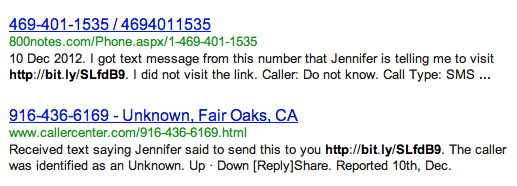Cramming, also known as SMiShing, is a fishing scam via text message. By replying to one of these messages or clicking a link in the message, you may be authorizing these scammers to charge monthly fees to your wireless phone bill.
As with many other forms of phishing scams, the offer or message may sound legitimate, but you should always double check before clicking a link in a suspicious message from an unknown number. If you are not sure, Google the URL before clicking it and review the results.
Here is a vague text from an unfamiliar number, but could be considered harmless if you have a friend named Jennifer.
“Jennifer said to send this to you http://bit.ly/SLfdB9“
After googling the link, it turns out many other people received the same message.

After Googling the bit.ly link, the only results are scam reporting forums and phishing reporting websites.
But it is not just links that can result in unwanted monthly charges, also beware of replying to SMS messages from unfamiliar numbers. Some messages even state that by replying “STOP” that all charges and SMS services will ceases, however this is not always true. If the message is a cramming text then by replying you are actually submitting to these unknown charges.
To avoid SMiShing, keep track of what services you use or subscribe to on your mobile device and be cautious when providing your cellphone number over the internet.
Also, take a closer look at your monthly bill; these unauthorized charges may be disguised as a third-party service such as “news alerts,” “app subscription,” “tax” and, Attorney General Biden reports in Delaware Online that it could be, something as inconspicuous as “premium messaging.” Usually the charges will be minimal, from a few cents to $10 or more. These charges are meant to be indistinguishable from other charges or subscriptions you may have on your wireless mobile device.
